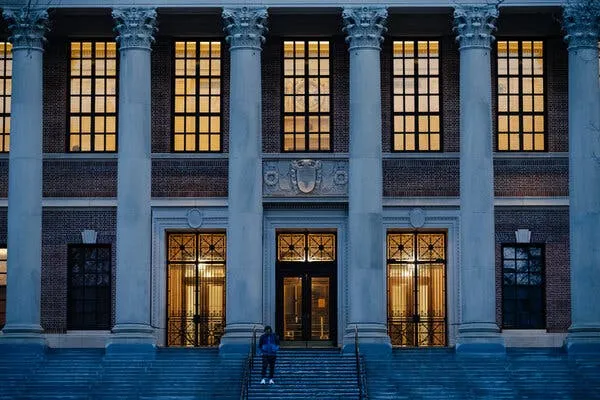Harvard’s Stand Against Trump: The University Takes a Bold Stance
In recent months, Harvard University has generated headlines for its outspoken resistance against former President Donald Trump. This seems to mark a significant shift in the role of academic institutions in the political arena, prompting many to question not only Harvard’s motives but also the potential ramifications for other universities and institutions across the United States.
Harvard’s Decision to Fight Back
Harvard’s pushback against Trump’s policies and rhetoric is not just an impulsive reaction; it is a culmination of the institution’s long-held values regarding inclusivity, justice, and freedom of expression. University President Larry Bacow, along with other faculty members, denounced Trump’s controversial stances on immigration, healthcare, and education, asserting that these policies contradict the core values of the institution and the broader American ideals of freedom and equality.
The university has committed to maintaining an inclusive atmosphere, which has been increasingly threatened under Trump’s administration. Trump’s harsh rhetoric against immigration, minority groups, and various social justice movements had not only sparked national conversations but also incited fear and division within academic circles. The decision for a concerted response from Harvard serves as both a protective barrier for its student body and a call to action for other institutions.
How Harvard’s Pushback May Embolden US Resistance
Harvard’s stance against Trump resonates with a growing sentiment among Americans who feel marginalized or ignored. As one of the most prestigious universities globally, Harvard’s actions may galvanize similar responses from other institutions. Politicians, activists, and university leaders are observing how Harvard navigates this turbulent political landscape, and their approaches may mimic or diverge based on Harvard’s outcomes.
Many universities have recognized that their influence extends beyond immediate educational settings; they are cornerstones of societal development and public discourse. Following Harvard’s lead, other universities have begun to openly address social and political issues, establishing initiatives that prioritize activism, diversity, and engagement. This shift has the potential to create a domino effect, leading to an era of heightened activism within higher education.
How Harvard Ended Up Leading the University Fight Against Trump
Harvard’s ascent as a leader in evaluating and challenging Trump’s legacy can be attributed to a combination of its historical precedence, scholarly resources, and a proactive administration. As one of the foremost academic institutions in the country, any stance taken by Harvard is likely to be scrutinized and widely broadcast. The university has a unique position owing to its network of alumni, influential faculty, and resources, which provide a robust platform for advocacy.
The foundation for this leadership role can be traced back to the establishment of the university’s values — values that prioritize academic freedom, social accountability, and the pursuit of knowledge. Harvard’s faculty and administrative decisions reflect a deep commitment to nurturing critical thinkers and fostering an environment where students can thrive, even amid politically charged contexts.
Expanding the Role of Universities in Politics
As political tensions heighten and societal divisions grow, the role of universities in the political sphere has come under increasing scrutiny. The idea that academic institutions should remain neutral has long been debated; however, Harvard’s recent actions challenge this belief. By being vocal in its opposition to Trump’s policies, Harvard is redefining what it means to be an educational institution in today’s America.
Academic Freedom vs. Political Engagement
The debate surrounding academic freedom and political engagement is at the very heart of Harvard’s current predicament. While the university’s mission traditionally upholds the importance of academic freedom, it also recognizes that silence in times of injustice is complicit silence. Thus, Harvard’s choice to confront Trump’s policies head-on is a deliberate re-evaluation of how universities choose to wield their influence.
The Implications for Future Generations
As Harvard emerges as a leader in the fight against Trumpism, it sets a precedent for future generations of students and educators. The incoming body of students is observing how institutions respond to oppression and injustice. Harvard’s role as a trailblazer in this political landscape speaks volumes to the responsibilities that universities hold in shaping future leaders.
The Impact of Activism on Campus Culture
With activism becoming increasingly prominent on campuses nationwide, students are encouraged to engage in conversations about justice and equality. Harvard’s move toward vocal resistance not only empowers existing student organizations but may also incite new waves of advocacy among students eager to make their voices heard. This environment of activism fosters collaboration across different groups who may have otherwise remained isolated from one another.
Conclusion: A Precedent for Resistance
Harvard’s fight against Trump represents more than just a university’s response to political grievances; it encapsulates the transformative potential of academic institutions in shaping societal norms and values. By taking a bold stand, Harvard is sending a clear message: they will not remain neutral in the face of policies and rhetoric that undermine their core values.
As universities across the nation observe and respond to Harvard’s actions, the potential for a broader movement emerges. Higher education institutions might find themselves at the forefront of resistance and activism, championing causes that resonate with current socio-political realities. The question remains: will this trend continue to grow, shaping not only campus culture but also the broader political landscape in the United States?
In the end, Harvard’s decision to fight back against Trump is not merely an isolated occurrence; it could mark the beginning of a new chapter in the role of universities and raise questions about how academic institutions can and should engage in politics moving forward.







